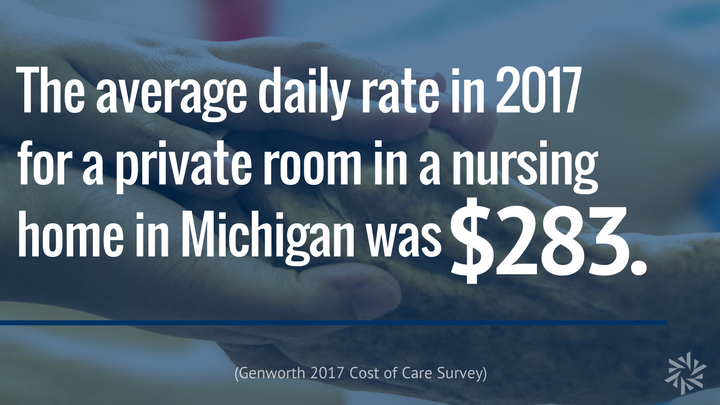What is Long-Term Care (LTC)?
Long-Term Care can refer to several types of care/services including:
- Nonmedical and/or medical care services for those who are physically and/or mentally unable to independently care for themselves.
- Care for those who require assistance performing activities of daily life (ADLs) or need assistance due to cognitive impairment from accident, illness or advanced age.
- Care provided in the home, assisted living facilities or skilled nursing facilities (for example, nursing homes).
Why Do I Need Long-Term Care Insurance?
As our population ages and lives longer, there is a growing need for at least some type of care. Most people fail to consider past the point of retirement. Health plans such as Medicare typically do not cover ongoing chronic care such as an extended stay in assisted living, nursing home or for a home health aide. This results in extremely high costs for long-term care when paid out-of-pocket.
A survey in 2017 by Genworth found that daily rates for nursing homes are high on average, but also can vary widely between states depending on availability of care.
- The average daily rate in 2017 for a private room in a nursing home in Michigan was $283.
- The 2016 average daily rate for a semi-private room in a nursing home in Michigan was $262.
- Daily private-pay rates vary widely depending on state. For example, according to a 2016 Genworth study, the lowest daily rate in 2016 for a private room was $173 in Missouri, while the highest came from Alaska at $816.

Common Myths About Long-Term Care & Long-Term Care Insurance
Myth: LTC means nursing home care. According to the National Care Planning Council, about 73% of LTC is provided in the home by caregivers who receive little or no compensation, such as family or friends.
Myth: LTC insurance is too expensive. LTC itself can very costly, compared to LTC insurance being reasonably priced.
Myth: You shouldn’t purchase LTC insurance until you’re in your 60s. It can be advantageous to purchase sooner because you may have less chance of being denied coverage due to health reasons and lower premiums due to your younger age.
Myth: I’m too young to need LTC. Accidents and illness that result in needed extended care can happen at any age. LTC and LTC insurance are not limited by age.
Myth: My family will take care of me. Even if your family isn’t spread out now, 10 or 20 years from now you could be spread geographically. Also, consider that your family may not be able to take time off or quit their job to be a full-time care giver.
Myth: Medicare or Medicaid covers LTC costs. Medicare only covers the cost for individuals of retirement age, and Medicaid only covers those with financial need. Regardless, neither will cover all your bills and have very specific provider networks.
Myth: My health insurance will cover Long-Term Care costs. Most health plans do not cover long-term care.
Myth: I can save enough on my own. The out-of-pocket costs for LTC are high, and the length of time you need care may be longer than you expect. Even a conservative saver may not be able to come up with enough money for LTC and their other living expenses.
Myth: I’ll just buy insurance if I am diagnosed with a possible LTC risk. You may be unable to purchase LTC coverage at that time, especially in the case of an unexpected accident or injury. LTC insurance has different rules that health insurance, a carrier can deny coverage based on certain medical or other conditions.
What Should I Know About Long-Term Care Insurance Trends & Predictions?
The number of employers offering group Long-Term Care insurance to their employees is rapidly growing. You can benefit from lower rates purchasing as part of group, and some employers may cover a portion of long-term care insurance. Another benefit to group coverage is there may be limited benefits available without medical questions/evidence of insurability.
Employers of all sizes can offer voluntary LTC insurance benefits, so check with your HR department to find out if your employer offers it or to talk about your interest in this coverage. If your employer doesn’t offer LTC insurance, Austin Benefits Group can help you find an individual policy that suits your needs and budget.
Long-Term Care isn’t just for the elderly, even people between the ages of 40 and 50 have disabilities that could require LTC. If you consider this trend, buying Long-Term Care insurance before retirement age can ensure you have coverage when you need it.
Women live longer than men on average, so they may need to buy a higher amount of LTC insurance and/or purchase earlier to lock lower rates.
How can I learn more about Long-Term Care Insurance for Myself or for My Employees?
Contact the experts at Austin Benefits Group today for a free consultation. Whether you are looking for individual or group coverage, we are here to help.




